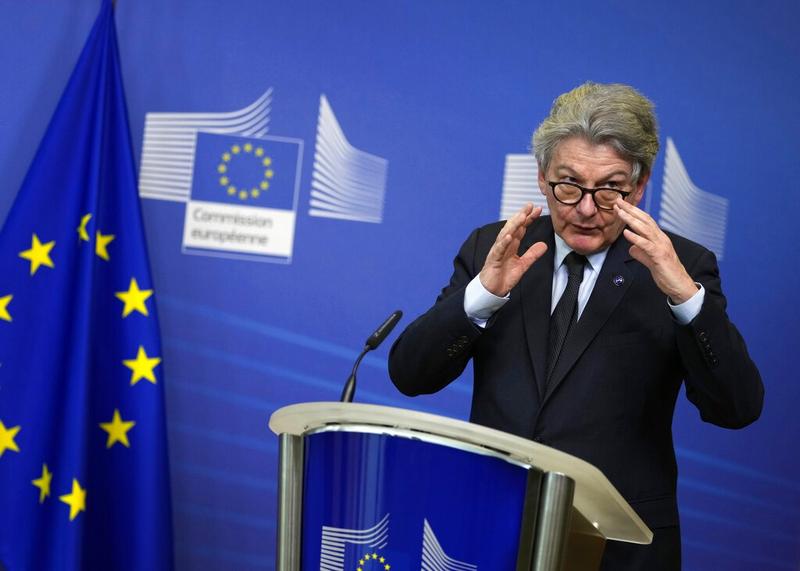Bloc aims to put $49b behind push to boost output and cut reliance on Asia
 European Commissioner for Internal Market Thierry Breton speaks during a signature ceremony regarding the Chips Act at EU headquarters in Brussels, Feb 8, 2022. (VIRGINIA MAYO, POOL / AP)
European Commissioner for Internal Market Thierry Breton speaks during a signature ceremony regarding the Chips Act at EU headquarters in Brussels, Feb 8, 2022. (VIRGINIA MAYO, POOL / AP)
The European Union rolled out a massive investment plan for the region's semiconductor industry on Tuesday in a bid to reduce its dependence on outside suppliers and become a key global player.
The European Chips Act aims to double the bloc's chip production by 2030 to account for 20 percent of all chips produced globally. It calls for a total investment of 43 billion euros ($49 billion), including 11 billion euros made available by the EU and the rest yet to be raised.
The act will be "a game changer for the global competitiveness of Europe's single market", European Commission President Ursula von der Leyen said on Tuesday.
She said that in the short term, it will increase the EU's resilience to future crises such as supply chain disruptions before helping to make Europe "an industrial leader in this strategic branch".
The commission is acting to address the bloc's heavy dependence on third-country suppliers, notably from Asia. The recent global chip shortage forced car production in some member states to fall by a third in 2021.
Commission Executive Vice-President Margarethe Vestager, who is in charge of the EU's digital transition, said: "We should not rely on one country or one company to ensure safety of supply. We must do more together-in research, innovation, design, production facilities-to ensure that Europe will be stronger as a key actor in the global value chain."
The EU hopes to see greater research into cutting-edge technologies, such as the development of chips below the 1-nanometer scale and the establishment of so-called mega-fabs within the EU to produce chips for the local and export markets.
European Commissioner for Internal Market Thierry Breton said that "securing the supply in the most advanced chips has become an economic and geopolitical priority".
The EU proposal came after the United States House of Representatives on Friday passed the America COMPETES Act of 2022, which includes $52 billion in grants to subsidize chip manufacturing.
In May, South Korea announced it would invest $450 billion to become a global chip powerhouse.
The European Chips Act allows a relaxation of the bloc's own state aid rules, which were designed to prevent unfair subsidies by member states from harming competition.
The move has been viewed by some as being at odds with the EU's long-standing complaints about some countries' use of state subsidies as part of an industrial policy that effectively results in government picking winners and losers.
A senior commission official in a background briefing said that the move was rarely used and only applied as a last-resort measure or in a crisis. Another official cited the US invocation of the Defense Production Act relating to COVID-19 vaccine production as a mechanism that the EU could learn from.
Composition of a crisis
"Once the EU, US and other market economies concede that governments must control production and allocation of resources in times of crisis, the only argument we have with 'planned economies' is what actually constitutes 'crisis'," said Hosuk Lee-Makiyama, director of the European Center for International Political Economy in Brussels.
Ding Chun, director of the Center for European Studies at Fudan University, said that the EU has used such vertical industrial policies in the past to support specific companies and industries.
"The EU now feels the challenge in the technology sector, in fields such as artificial intelligence and information technology, from the US and a fast-rising China, so it is picking up the vertical industrial policy again," he said.
Ding describes the EU Chips Act as different from the US one, which is all about geopolitical rivalry with China, as evident with the targeting of Chinese firms through the government's Entity List.
He Zhigao, a researcher at the Institute of European Studies at the Chinese Academy of Social Sciences, said: "If the EU cannot successfully tackle its challenge of a fragmented market within the bloc, and if it follows the US in technological decoupling, then it won't be able to gain an advantage in chip competition."
The Chips Act needs to be approved by the European Parliament and discussed by member states before becoming applicable across the bloc.


